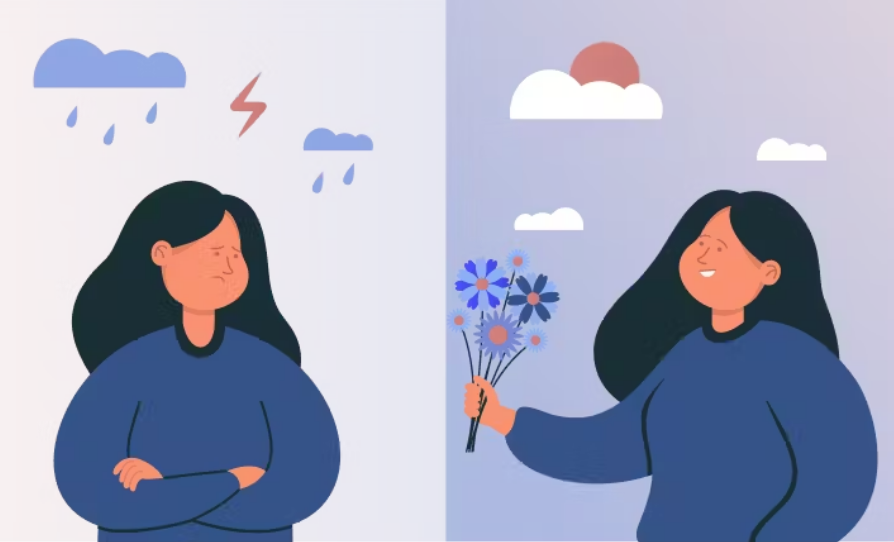Our mood is influenced by many things, from the personal challenges we’re facing, events in the world, how fulfilled we’re feeling in our daily activities, our relationships, diet, exercise, and much more.
One often forgotten factor than can play a part in our mood is the weather. Have you ever noticed on a rainy day that you might feel a little lower in the morning, or find it harder to get out of bed? This is a common experience, and with this in mind as we are approaching winter, the team at THIS WAY UP has some tips about maintaining your mood in the cooler months.
Why do the cooler months affect my mood?
Winter months bring a drop in temperature and reduced hours of sunlight, which may mean we spend more time indoors or experience a change in our routine. This doesn’t mean our mood is guaranteed to drop, but it can make us a little more vulnerable to patterns of behaviours that could impact feelings of isolation and lethargy, which when prolonged, can lead to low mood.

What can help to maintain my mood during winter?
The winter months may affect some folks’ moods more than others, which is okay. We are all unique and will have different levels of sensitivity to these changes.
See which ‘cool mood’ tips resonate with you, and follow-through with actioning these in your daily routine.
‘COOL MOOD’ tips for the winter weather
Connect With Others: Spending more time indoors shouldn’t mean disconnecting from our friends and family. Plan activities with your loved ones regularly that can work flexibly around the weather. Social connection can boost your mood, improve sleep, and overall quality of life.
Offline Time: When it’s cold outside, it’s tempting to spend more time scrolling on your phone, watching movies, and clocking up lots of screen-time. These activities can be healthy when done in moderation, but prolonged screen-time is unhelpful for your mental wellbeing. Consider setting some limits with how much time your eyes are on screens, and try some alternative activities (e.g., reading, cooking, puzzles, indoor exercise).
Outdoors Time: Despite the cooler temperature and occasional rainy days, it’s important to spend time outdoors in the fresh air. Be deliberate about getting outdoors when you can each day, even if there’s a bit of rain. Be open to enjoying the winter weather – use mindfulness to tune in to your senses, smelling the rain, feeling the cooler air on your skin, and notice how you feel.
Light Each Day: Sunlight has significant benefits for our sleep, mood, and overall health. This may mean rearranging your daily schedule as the sun sets earlier in the evening. Vitamin D levels typically lower in the winter, making us more prone to fatigue. Exercise generates endorphins and dopamine, so we may need to be more deliberate with producing these “feel good” chemicals in the winter.
Move Your Body: You may need to get creative and flexible in the ways you move your body if your usual exercise or sporting activities are less available. Perhaps you can try an online dance class, join your local gym, or join an indoor social sporting team. Regular movement and exercise can improve your mood and should remain a priority throughout the cooler months.
Open Up: We might be staying indoors a little more, but it’s important to stay open with friends, family, loved ones, and your community. Staying indoors doesn’t have to mean isolation, withdrawal, or going inward. If you notice that you’re starting to feel a little down, talk to someone you trust about how you’re feeling. The act of sharing this feeling often makes us feel much better. You can also be a support for those around you who might be feeling a similar way.
Offer Your Time: If you have a little more time in the winter months due to reduced outdoor activities, perhaps you could consider volunteering your time to a cause that is meaningful to you. Offer to help out at a local community group, charity organisation, or help on a project that aligns with your values. Helping others is a wonderful way to build connection and purpose, and can boost your mood significantly.
Daily Routine: If you’ve had to shuffle your previous routine from the warmer months, see if you can create a new daily routine that includes (1) something you can achieve (2) something enjoyable for yourself, and (3) some connection with others. These can be small actions, like sending emails you’ve been putting off, cooking a new meal, sending a text to a loved one, or taking a nice warm shower. Be intentional about having these activities in your routine to keep a sense of structure and enjoyment during the cooler months.

Wintertime sadness
Many of us will find our mood can be affected mildly and temporarily as a result of the factors described that are unique to winter. However, if you find that your sadness won’t go away and is harder to shake, if feeling down is affecting your ability to do the things you want or need to do or if it’s affecting your work, study, health, relationships or home life, it may be that you’re experiencing something more serious than weather-induced changes to your mood.
If so, please see your GP for a more thorough check up of your mood or use our Wellbeing Test to see how you are feeling.


